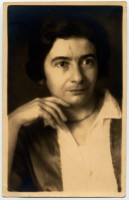

Queer Places:
Contrescarpe 93, 28195 Bremen, Germany
 Dora Bromberger (June 16, 1881 – July 28, 1942) was German artist who worked primarily
with watercolor and oils, painting
expressionist landscapes.
Dora Bromberger (June 16, 1881 – July 28, 1942) was German artist who worked primarily
with watercolor and oils, painting
expressionist landscapes.
She was born into a family of musicians in Bremen, Germany. She was the daughter of Professor David Bromberger (born 1853 in Cologne), who played a prominent role in Bremen's musical life as a pianist, composer and teacher. Married to Franziska Steinberg (born 1856) since 1878, he bought a house in 1879, Contrescarpe 93, where Dora grew up with her sister Henriette (Henny) and her brother Siegfried. The three children were baptized in Bremen Cathedral on March 26, 1888, while the parents stuck to their Judaism, but were open to all questions of faith. After the early loss of his wife in 1905, David Bromberger lived in his house until his death; he died in 1930. Dora and Henny lived here until they were deported. Her parents' house was "Aryanized" in 1941.
Dora Bromberger was one of the most famous Bremen painters of the twenties and early thirties. After studying in Paris, the artist lived in Munich from 1915 to 1923, where she had already been studying in 1912/13 at the school of Hans Hofmann. After returning to Bremen, she became a member of the Bremen Artists' Association and has been involved almost constantly in its annual exhibitions in the Kunsthalle since 1924. She was considered a master of watercolor art. Dora Bromberger's work was shown internationally as well as in the Kunsthalle Bremen and the 1928 exhibition Deutscher Kunst der Gegenwart (German Contemporary Art) in Nüremberg.[1]
Her sister Henriette Bromberger, like her father, had the pedagogical talent to train highly gifted musicians from an early age. But not only as a piano teacher, but also as a concert pianist, she gained a high reputation in the Hanseatic city before the Nazi regime excluded her from the public due to her Jewish origin and prevented her teaching. For a long time she was a welcome guest in numerous well-known Bremen families thanks to her house concerts.
With the increasing influence of the National Socialists, she was continually harassed for her religious heritage. While her brother successfully emigrated to Cuba in 1939, Bromberger was unable to leave the country. The painter Elisabeth Noltenius remained a close friend and supported her during this time despite interrogations by the Gestapo. On November 18, 1941, Dora and Henny Bromberger were deported to the Minsk ghetto and murdered in the Maly Trostinez extermination camp in 1942. After the war they were declared dead.[2] Her brother, the merchant Siegfried Bromberger, escaped the Holocaust by emigrating to Cuba and died on December 31, 1966.
Two stumbling blocks in front of the Contrescarpe No. 93 parents' house commemorate the two sisters.
My published books: